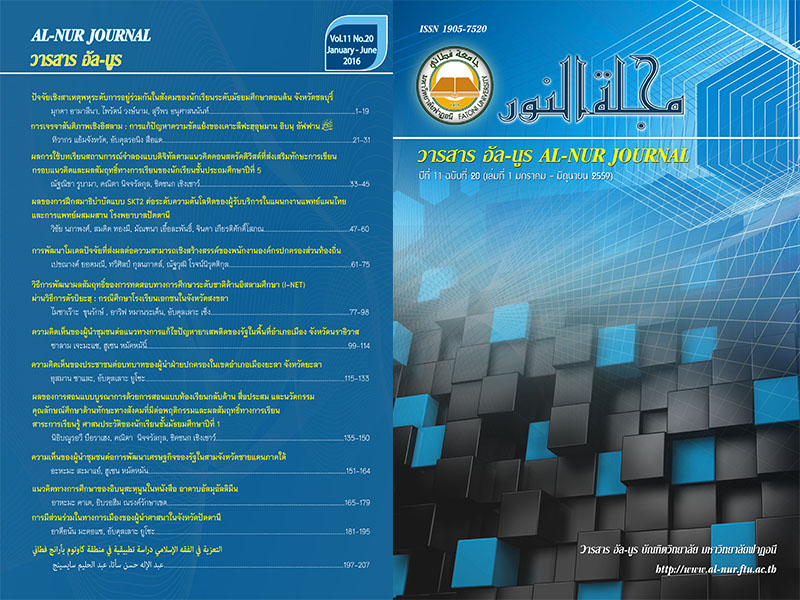ความคิดเห็นของผู้นำชุมชนต่อแนวทางการแก้ไขปัญหายาเสพติดของรัฐ ในพื้นที่อำเภอเมือง จังหวัดนราธิวาส
Abstract
บทคัดย่อ
วิจัยนี้มีวัตถุประสงค์ เพื่อศึกษาความเห็นของผู้นำชุมชนต่อแนวทางการแก้ไขปัญหายาเสพติดของรัฐในเขตอำเภอเมือง จังหวัดนราธิวาส โดยการสัมภาษณ์ผู้นำชุมชนในเขตอำเภอเมืองจังหวัดนราธิวาส แบบเจาะจง ซึ่งประกอบด้วย สมาชิกสภาองค์การบริหารส่วนท้องถิ่น กำนันผู้ใหญ่บ้าน อิหม่าม คอเต็บ บิลาล ปราชญ์ชาวบ้านจำนวน 42 คน และทำการวิเคราะห์ข้อมูลเชิงพรรณนา
ผลการศึกษาพบว่า แนวทางการสร้างพลังดินและการลดเงื่อนไขการระบาดของยาเสพติด ในกิจกรรมการรณรงค์รัฐจะเน้นที่เฉพาะกลุ่มเยาวชนอย่างเดียวแต่ไม่ได้เน้นรณรงค์ให้ความตระหนักแก่ผู้ปกครองของแต่ละบ้าน ผู้นำชุมชนเห็นด้วยกับนโยบายการสร้างอาชีพเพราะมองว่าเป็นการแก้ปัญหาเรื่องยาเสพติดได้ดีและยั่งยืน รัฐไม่ค่อยรับความคิดเห็นจากภาคประชาชนมาเป็นแนวทางการแก้ไขปัญหายาเสพติด แต่สั่งมาจากเบื้องบนนอกจากนี้แล้วยังขาดการบูรนาการระหว่างองค์กรเอกชนกับหน่วยงานรัฐ สำหรับแนวทางการควบคุมชุมชน สังคมและสิ่งแวดล้อมเพื่อลดปัญหายาเสพติดด้วยการเพิ่มเจ้าหน้าที่อาสาสมัครแต่ขาดความจริงจังและจริงใจในการปฏิบัติหน้าที่และเจ้าหน้าที่มักจะเป็นคนนอกพื้นที่มากกว่าในพื้นที่ที่ไม่ค่อยเข้าใจบริบททางสังคม ส่วนแนวแนวทางการบำบัดรักษาและฟื้นฟูสมรรถภาพของผู้ติดยาเสพติด โครงการต่างๆขาดความต่อเนื่องและการติดตามหลังจากปิดค่ายแล้วคือเมื่อโครงการหมดลงหรืองบประมาณหมดลงทุกอย่างก็จะจบลง รัฐเน้นการรักษาผู้ติดยาแต่ไม่ได้ให้ความสำคัญในการพัฒนาศักยภาพของครอบครัว คนในท้องถิ่นไม่ได้ถูกดึงเข้ามีมีส่วนร่วม ขาดการคัดครองแยกแยะระหว่างกลุ่มเสี่ยงกับผู้ติดยาทำให้โครงการไม่ประสบผลสำเร็จเท่าที่ควร ในยุทศาสตร์การบำบัดรักษาดูแลฟื้นฟูสมรรถภาพของผู้ติดยา รัฐจะมุ่งเน้นไห้ความสำคัญที่ปลายเหตุมากกว่าต้นเหตุ
คำสำคัญ: ยาเสพติด ภัยคุกคามความมั่นคง
Abstract
The Objective of this research is to study the opinions of community leaders on drug problem solution of government in Mueang distric Narathiwat province by purposing sample interviews 42 community leaders in Mueang district area Narathiwat province, which compose of members of the local authorities; head village administrative Imam, Khateb, Bilal community scholars, and analyzed data in descriptive.
The study found that the soil empowerment and drug spreading reducing condition solution; in promotion campaign the government has focused only activities of the youth groups not focus on building awareness to the parents of each family. Most of community leaders agree on policies to create jobs as it could be sustainable of drug problem solving, the government rarely get feedback from the public in dealing with drug problem solution but rather receiving orders from high rank office, in addition lacking integration between state agencies and none-state agencies. For community and environment controlling for reducing the drug problem by increasing volunteer staff, but lack of seriousness and sincerity in the performance of duties and most volunteer staff are outsider rather than taking from native that have better understanding to their social context. For treatment and rehabilitation of drug addicts; after camp campaign closed there is no continuity and follow-up after that when the budget has finished everything has finished as well, state focused on the treatment of drug addiction but did not give priority to the development of the family, local people are not invited to participate, in finding out drug addict member for joining camp campaign lack of screening distinguish between susceptible and drug addict that cause to unsuccessful, in treatment strategy and rehabilitation of drug addicts state tend to focus on end cause rather than focus on earlier protections.
Keywords: Drug, Security threat.



